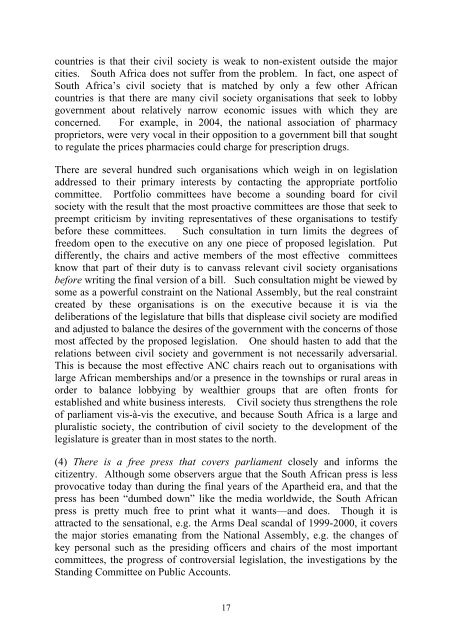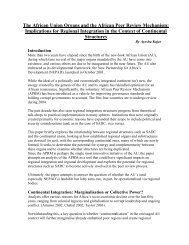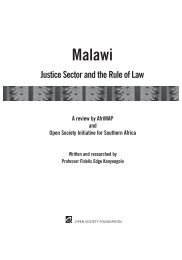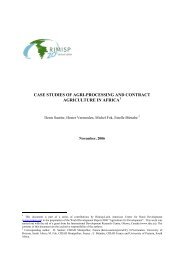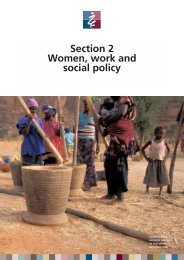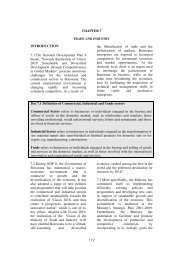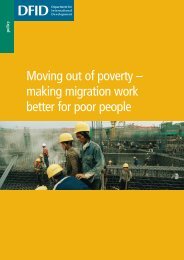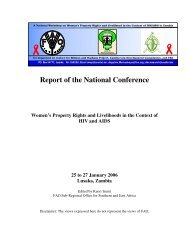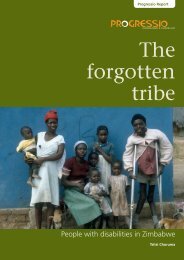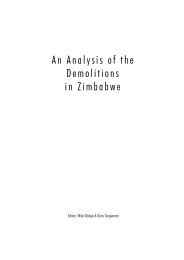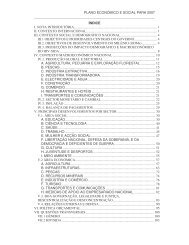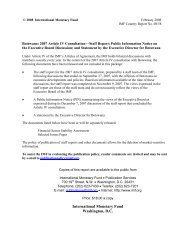400Kb ~ 2 min (33 pages) - SARPN
400Kb ~ 2 min (33 pages) - SARPN
400Kb ~ 2 min (33 pages) - SARPN
Create successful ePaper yourself
Turn your PDF publications into a flip-book with our unique Google optimized e-Paper software.
countries is that their civil society is weak to non-existent outside the majorcities. South Africa does not suffer from the problem. In fact, one aspect ofSouth Africa’s civil society that is matched by only a few other Africancountries is that there are many civil society organisations that seek to lobbygovernment about relatively narrow economic issues with which they areconcerned. For example, in 2004, the national association of pharmacyproprietors, were very vocal in their opposition to a government bill that soughtto regulate the prices pharmacies could charge for prescription drugs.There are several hundred such organisations which weigh in on legislationaddressed to their primary interests by contacting the appropriate portfoliocommittee. Portfolio committees have become a sounding board for civilsociety with the result that the most proactive committees are those that seek topreempt criticism by inviting representatives of these organisations to testifybefore these committees. Such consultation in turn limits the degrees offreedom open to the executive on any one piece of proposed legislation. Putdifferently, the chairs and active members of the most effective committeesknow that part of their duty is to canvass relevant civil society organisationsbefore writing the final version of a bill. Such consultation might be viewed bysome as a powerful constraint on the National Assembly, but the real constraintcreated by these organisations is on the executive because it is via thedeliberations of the legislature that bills that displease civil society are modifiedand adjusted to balance the desires of the government with the concerns of thosemost affected by the proposed legislation. One should hasten to add that therelations between civil society and government is not necessarily adversarial.This is because the most effective ANC chairs reach out to organisations withlarge African memberships and/or a presence in the townships or rural areas inorder to balance lobbying by wealthier groups that are often fronts forestablished and white business interests. Civil society thus strengthens the roleof parliament vis-à-vis the executive, and because South Africa is a large andpluralistic society, the contribution of civil society to the development of thelegislature is greater than in most states to the north.(4) There is a free press that covers parliament closely and informs thecitizentry. Although some observers argue that the South African press is lessprovocative today than during the final years of the Apartheid era, and that thepress has been “dumbed down” like the media worldwide, the South Africanpress is pretty much free to print what it wants—and does. Though it isattracted to the sensational, e.g. the Arms Deal scandal of 1999-2000, it coversthe major stories emanating from the National Assembly, e.g. the changes ofkey personal such as the presiding officers and chairs of the most importantcommittees, the progress of controversial legislation, the investigations by theStanding Committee on Public Accounts.17


